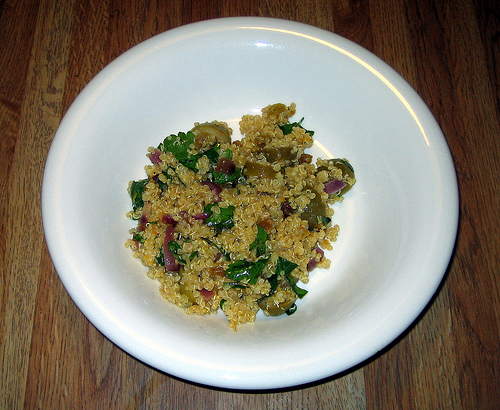With the rise of large supermarkets and the global economy, the number of food options has grown exponentially. You can now find pretty much anything in a supermarket, anytime you want it. Yet, for all the added convenience, there is a trade off. Too often, that gets ignored. Here are two foods with backgrounds you might not want to know about.
1. Quinoa: Just five years ago, hardly anyone outside of Bolivia ate quinoa, considered by many to be the lost grain of the Incas. Then, out of nowhere it exploded. People in rich countries in North America and Europe suddenly developed a real taste for the crop and began demanding it as an export. The global market responded and quinoa prices more than tripled in five years. That increase has meant more money for the local farmers of Bolivia that grow it, but also means fewer Bolivians can actually afford to buy quinoa. In fact, young children in the regions where quinoa grows now turn to cheap, processed foods, and that has led to a wave of malnutrition.
Admittedly, another part of the problem comes from changing palates among younger people. They no longer prefer the taste of quinoa and would rather drink products like Coca Cola. Still, this comment from an economist to The New York Times is quite crass: “It’s kind of discouraging to see stuff like this happen, but that’s part of life and economics." As long as you're making money, right buddy?
2) Chickens: If you're looking for a reason to convince people that eating chicken is bad, look no further. A new scientific study shows that chickens are capable of feeling empathy. They can feel another's pain, which is a key component of feeling compassion. To complete the research, scientists exposed young chicks to puffs of air. They showed signs of distress, which their mothers then mirrored. Their heart rates increased as their eye temperature lowered— considered by many to be classic signs of stress.
The results are particularly important because of how chickens live on farms. They often will encounter stressful conditions or will be placed in such conditions by their owners.
Photo by karenandbrademerson/ StevenW.













Comments
March 22, 2011
I raise my own chickens in a fairly stress-free environment. They are spoiled and pampered and never have to worry about any of the typical predators. My egg layers have names and will never be eaten. They show great signs of intelligence and humor. The meat birds are mercifully stupid. I still treat them very well and thank them and have a prayer with them when I take them for processing...
March 22, 2011
Ironic that 6 of the related posts to the "If you’re looking for a reason to convince people that eating chicken is bad, look no further" article are chicken recipes ...
March 22, 2011
Only 2?
March 22, 2011
Lora..you are right about that irony! The truth is that "chicken" is by far the most searched term on our website and we have a lot of recipes for chicken added by the community. Choosing what to eat and not isn't easy for most of us. Our goal with these posts is to arm people with information so everyone can make more informed decisions.
March 23, 2011
whatever you say, chicken is so good in taste!!!
March 23, 2011
I agree ... there's a world of difference between inhumane chicken production and compassionate, kind chicken raising. I wouldn't have the slightest bit of guilt about raising chickens to run around outside and be treated kindly. As it is, I have no guilt about eating chickens at all -- I don't think the fact that mother hens are distressed by seeing their chicks distressed means that they are in any way equivalent to humans. They just have a protective instinct toward their chicks. I suspect cows have the same.